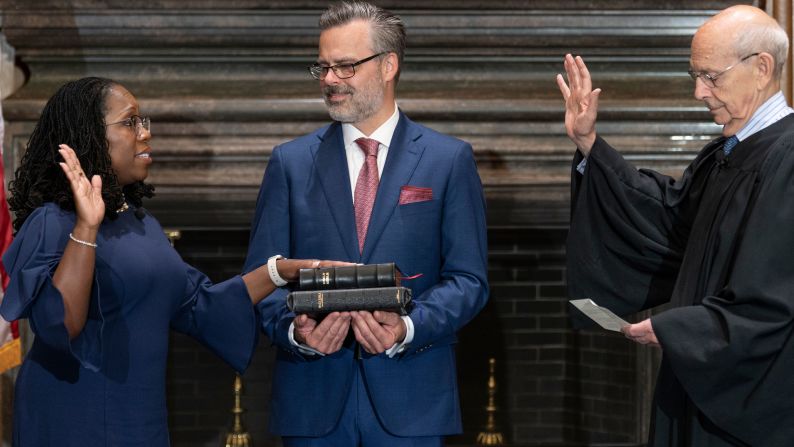Senior Democrats are treading carefully around Justice Stephen Breyer these days, worried that a progressive push to get him to retire could either anger him or come off as overtly political – in either case potentially dashing their hopes of getting a young new liberal on the Supreme Court in his place.
The clock is ticking for the party, because the Senate could fall into Republican hands during the midterm elections next year – or, actually, at any moment. Two members of the Democratic majority are near or just over 80 years old, and they hail from a state where a Republican governor would name their replacement if they weren’t able to serve.
RELATED: How Amy Coney Barrett has changed the Supreme Court in ways Kavanaugh hasn’t
But Breyer – at age 82 the senior liberal on the Supreme Court – is keen on keeping the high court free of political influence. And at a moment when a Democratic president gets to nominate any new justice, and Democrats hold the Senate’s tie-breaking vote on confirmation, an open campaign to squeeze him out could have the opposite of the intended effect.
So while many congressional Democrats admit the ticking clock is on their minds, multiple sources tell CNN, they’re almost all keeping a studiously respectful distance.
In conversations with CNN, White House officials hew to their public message that there is no open seat on the bench and they’re staying out of the matter until there is. Behind the scenes, though, there are preparations for one of the most significant tasks that could fall to President Joe Biden, who has promised to nominate a Black woman for the job whenever it is available.
Officials insist that task isn’t contingent on Breyer, but rather is something that any administration would do given the high stakes and the ever-present possibility of a departure. The fear, according to multiple Democrats, is that such a push could cause Breyer to dig in and decide to serve out beyond the 2022 midterms, when control of the 50-50 Senate is again at stake.
“I’m not sure that that kind of pressure on Justice Breyer is actually helpful in his decision making,” said Sen. Sheldon Whitehouse of Rhode Island, a Democrat on the Senate Judiciary Committee. “I don’t know the man well enough, but I know plenty of people whose backs would get up when subjected to that kind of pressure. And it’s certainly plausible.”
Sen. Jack Reed, another Rhode Island Democrat who has known Breyer since he was an adviser of his at Harvard Law School, said of a pressure campaign: “No, I don’t think it works.”
For his part, Breyer is silent on the issue, even after one liberal group hired a billboard truck to circle the Supreme Court building last month bearing the rhyming slogan, “Breyer, Retire.” His retirement likely would not change the court’s 6-3 conservative majority, but it could bring on board a younger justice to serve for decades.
As a former Senate staffer himself, Breyer is well aware of how precarious the Democratic majority is in the Senate, with only a tie-vote majority and elderly members among its ranks.
Breyer personally witnessed how the late Justice Ruth Bader Ginsburg struggled to keep her cancer at bay long enough for a Democratic president to be elected and name her replacement. Ginsburg lost her battle two months before the election, clearing the way for then-President Donald Trump to fill her seat with the conservative Justice Amy Coney Barrett.
One House Democrat, Rep. Mondaire Jones of New York, has publicly called on Breyer to quit, citing Ginsburg’s death as a cautionary tale for Democrats.
“My goodness: Have we not learned our lesson?” Jones told Cheddar News last month.
People close to Breyer say he loves his job and that he might now have a clearer understanding of why it was so difficult for Ginsburg to leave the marble palace. By outward appearances, he seems healthy and has been an active participant on the bench. He has appeared publicly, via Zoom, for speaking engagements this year more than any other justice.
One former clerk, who declined to speak on the record, believes that Breyer will step down although has not spoken directly with his former boss on the subject. Those close to Breyer are infuriated by the retirement pressure from Demand Justice and others, even though they think he will still make his decision based on concern for the well-being of the institution and not because of pressure from liberal groups.
In the meantime, progressives are armed with a short list that includes two African American women, California Supreme Court Justice Leondra Kruger and federal Judge Ketanji Brown Jackson. Jackson, a former Breyer clerk, has already been nominated to the US Court of Appeals for the District of Columbia. Her hearing last week was seen as a test for a potential Supreme Court nomination.
But the White House isn’t talking about replacements, focusing instead on filling open seats on the federal bench. “He believes that’s a decision Justice Breyer will make when he decides it’s time to no longer serve on the Supreme Court,” White House press secretary Jen Psaki said of Biden’s position.
Will he stay?
If Breyer were to wait a term before stepping down it would give Jackson some seasoning on the DC appeals court, a prominent launching pad for justices such as Chief Justice John Roberts, Justices Clarence Thomas and Brett Kavanaugh, and the late Justices Ginsburg and Antonin Scalia.
It would also leave Breyer, who has served on the bench for almost 30 years, to grapple with blockbuster issues that are likely to hit the court next term, among them gun rights, abortion and voting rights. He might feel like he has the experience and prior relationships to shape the progressive arguments in those cases and, perhaps, contain the damage.
Breyer might also dislike the optics of stepping down now for fear it would be perceived as a political move. He often talks about the separation of powers, as he did last month in a speech at Harvard Law School.
If the public sees judges as “politicians in robes, its confidence in the courts, and in the rule of law itself, can only diminish, diminishing the court’s power, including its power to act as a check on the other branches,” Breyer said.
Some court watchers note that Breyer has hired a full complement of clerks for the next court term, taking it as a sign that he might stick around.
“I now believe that there’s a 70-30 chance that Justice Breyer will remain on the court for at least one more term,” lawyer David Lat wrote on his Original Jurisdiction Substack, where he reported Breyer’s hiring of four clerks.
Or will he go?
Breyer, ever the pragmatic, may believe that the time is right for him to go, clearing the way for a younger progressive to build from his legacy. He may believe he has no role in naming his replacement and leave it to officials in the White House, with a President and Vice President Kamala Harris who both served on the Senate Judiciary committee, as well as chief of staff Ron Klain – who has worked in the judicial trenches for years – to make the decision.
The White House Counsel’s Office is fully staffed, led by White House Counsel Dana Remus. Remus, a former clerk to Justice Samuel Alito, has moved aggressively to fill lower court seats.
Senate Judiciary Chairman Dick Durbin, an Illinois Democrat, told CNN he considers it “presumptuous” to speculate, and others are of the same mind.
Sen. Dianne Feinstein said Breyer’s retirement would be a “great loss.” Now in her late 80s, the California Democrat has also heard recent calls from longtime supporters for her to retire and open up a Senate seat for someone else.
“My general belief is, if a person is serving with integrity and working hard and producing for whatever the constituency is, that’s what these jobs are all about,” said Feinstein.























































